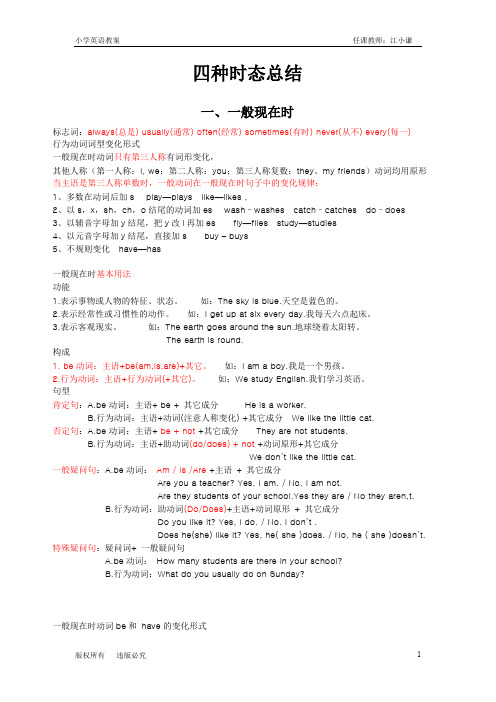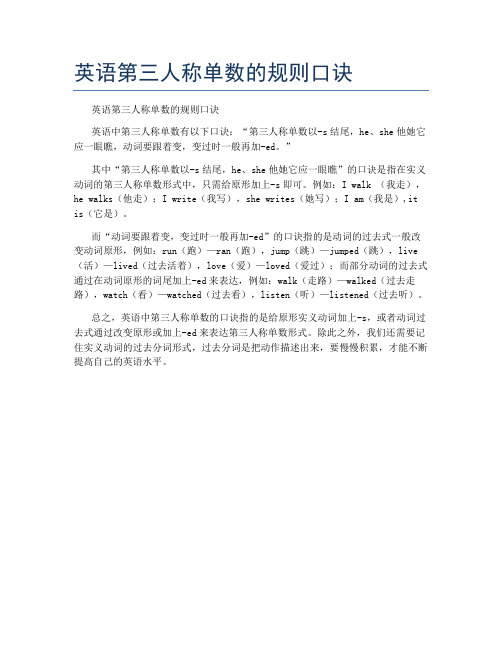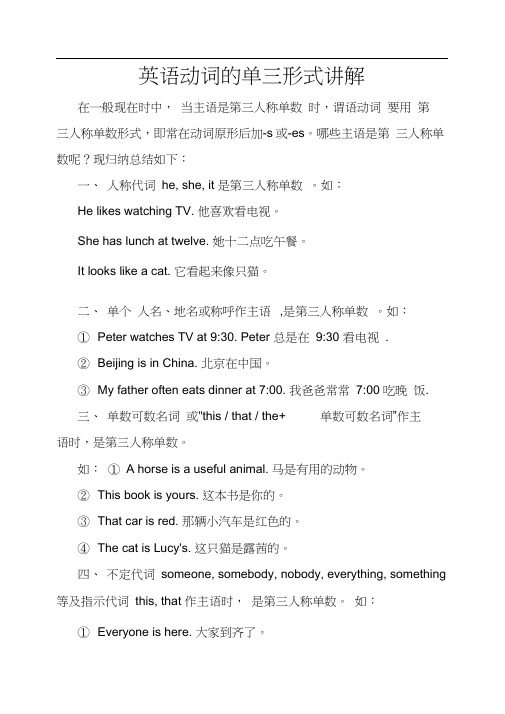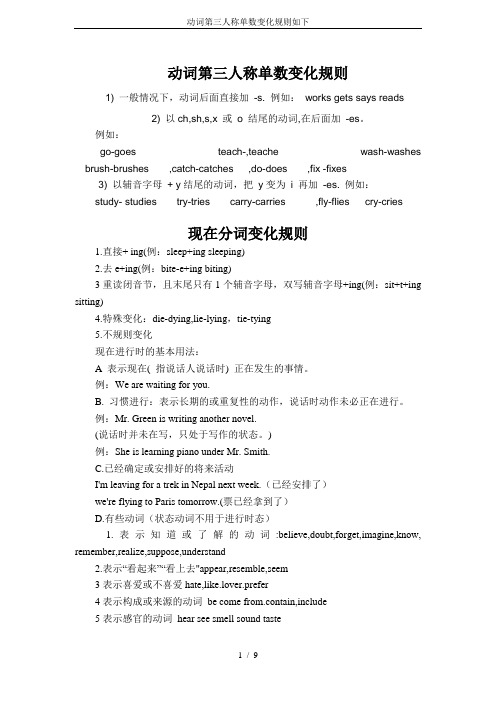(word完整版)小学六年级英语动词的第三人称单数
小学英语人教PEP新版六年级上册Unit 4三人称 (1)

Thanks!
I live (居住) in Beijing.
He lives(居住) in Australia.
Does your pen pal live in Shanghai? No, he doesn’t
Does she/he cook Chinese food?
Yes, he/she like.
用动词的适当形式填空:
He often watches TV in the evening. He go es to school by bus every day
人称代词: 单数
复数
第一人称:I we 第二人称:you you 第三人称:he, she, it they 单个的人名 my mother,my aunt.
精品课件
小学英语人教PEP新版 六年级上册
市实小 清风制作
What are your hobbies? I like …….动词的ing
What are her/his hobbies?
She/ He likes … …动词的ing
My pen pal lives in Qianjiang. He likes watching TV
•写出下列动词的第 三 人称单数形式
• read – • look – • work – • say – • run – • go – • do – • watch – • teach – • have – reads looks works says runs goes does watches teaches has
• 1. 一般情况下,动词后直接 加s. works, gets, reads等. • 2.以s,x,ch,sh或o结尾 的动词,在后面加es • goes, teaches, watches等。 • 3、以辅音字母加y 结尾的, 改y为i,加es, • study__studies • 4特殊: • have—has,如:He has an interesting book .
新标准英语六年级下册专题复习——动词的第三人称单数、现在分词、过去式变化规则及发音规则

新标准英语六年级下册专题复习——动词的第三人称单数、现在分词、过去式变化规则及发音规则(后附:清浊辅音、开闭音节、可数名词复数变化规则)动词的第三人称单数及发音规则:1. 一般直接在词尾加-s,-s在清辅音后读/s/,在浊辅音或元音后读/z/, ds读/dz/, ts读/ts如help helps/s/ know knows/z/ get gets/s/ read reads/z/2. 以字母s, x, ch, sh或有些以o 结尾的动词加-es,-es 读/iz/如guess guesses fix fixes teach teaches wash washes 注意:go goes/z/ do does /z/3. 辅音字母+y结尾的动词,先变y为i,再加-es,-ies读/iz/如carry carries fly flies注意:在play---plays,say----says中,字母y前为元音字母,第三人称单数形式直接在动词后加-s4. be动词的第三人称单数分别为am, is,(are是you你的单数), have则为has注意:以不发音字母“e”结尾的开音节词,如果尾音是/s/,/z/,加-s后,字母”e”发音,与所加-s一起读作/iz/,如close closes/iz/动词的现在分词(动词的ing形式)变化规则:1. 一般情况直接加ing,如look—looking go---going visit---visiting2. 以不发音的e结尾的,去e再加ing,如come---coming make---making write---writing3. 以重读闭音节结尾并且只有一个辅音字母的,双写该辅音字母,再加ing如run---running stop---stopping get---getting swim---swimming begin---beginning4. 以辅音字母加y结尾的,直接加ing,如study---studying carry---carryingfly---flying cry---crying5. 以ie结尾的重度开音节动词,先变ie为y,再加ing,如die---dying tie---tyinglie---lying 动词的过去式变化规则:1. 规则变化(1)一般直接在动词后加ed,-ed在清辅音后读/t/, 在浊辅音及元音后读/d,/-ed在/t//d/后读/id/如call---called open---opened look---looked want---wanted /id/ need---needed /id/ (2)以不发音的“e”结尾的,直接加-d ,如live---lived move---moved hope---hoped (3)以辅音字母加y结尾的动词,先变y为i,再加-ed,如study---studied cry---criedtry---tried 注意:如果是元音字母加y结尾的,还是直接加-ed,如,play---played,enjoy---enjoyed(4)以一个辅音字母结尾的重读闭音节动词,双写最后一个辅音字母,再加-ed 如plan---planned fit---fitted stop---stopped2. 不规则变化(要特殊记忆)。
(完整版)小学英语时态总结

四种时态总结一、一般现在时标志词:always(总是) usually(通常) often(经常) sometimes(有时) never(从不) every(每一)行为动词词型变化形式一般现在时动词只有第三人称有词形变化,其他人称(第一人称:I, we;第二人称:you;第三人称复数:they、my friends)动词均用原形当主语是第三人称单数时,一般动词在一般现在时句子中的变化规律:1、多数在动词后加s play—plays like—likes ,2、以s,x,sh,ch,o结尾的动词加es wash–washes catch–catches do–does3、以辅音字母加y结尾,把y改i再加es fly—flies study—studies4、以元音字母加y结尾,直接加s buy – buys5、不规则变化have—has一般现在时基本用法功能1.表示事物或人物的特征、状态。
如:The sky is blue.天空是蓝色的。
2.表示经常性或习惯性的动作。
如:I get up at six every day.我每天六点起床。
3.表示客观现实。
如:The earth goes around the sun.地球绕着太阳转。
The earth is round.构成1. be动词:主语+be(am,is,are)+其它。
如:I am a boy.我是一个男孩。
2.行为动词:主语+行为动词(+其它)。
如:We study English.我们学习英语。
句型肯定句:A.be动词:主语+ be + 其它成分He is a worker.B.行为动词:主语+动词(注意人称变化) +其它成分We like the little cat.否定句:A.be动词:主语+ be + not +其它成分They are not students.B.行为动词:主语+助动词(do/does) + not +动词原形+其它成分We don’t like the little cat.一般疑问句:A.be动词:Am / Is /Are +主语+ 其它成分Are you a teacher? Yes, I am. / No, I am not.Are they students of your school.Yes they are / No they aren,t.B.行为动词:助动词(Do/Does)+主语+动词原形+ 其它成分Do you like it? Yes, I do. / No. I don’t . Does he(she) like it? Yes, he( she )does. / No, he ( she )doesn’t.特殊疑问句:疑问词+ 一般疑问句A.be动词:How many students are there in your school?B.行为动词:What do you usually do on Sunday?一般现在时动词be和have的变化形式1.动词Be 叫连系动词, 用法:第一人称单数用am,第三人称单数用is,其它人称用are。
小学六年级英语动词的第三人称单数知识讲解

小学六年级英语动词的第三人称单数小学英语语法:“第三人称单数”第三人称有“他、她、它以及一些单数名词”。
当主语是第三人称单数时,谓语动词要用第三人称单数形式,即常在动词原形后加-s或-es。
一、动词第三人称单数的变化规则及发音规律动词原形变第三人称单数的规则与发音规律同名词单数变复数大致相同,请认真观察。
1、大多数动词在词尾加“S”如:stop-stops [s] ; make-makes [s] read-reads [z] ; play-plays [z]2、以辅音字母加“y”结尾的,要先将“y”变为“i”,然后在加“es”读[iz] 如:fly-flies [z]; carry-carries [z] study-studies [z]; worry-worries3、以“s, x, ch, sh”结尾的,在词尾加“es”,发音为[iz] 如:teach-teaches [iz]; watch-watches [iz]4、以“o”结尾的动词,加“es”,如:go-goes [z] do-does [z]注:下面几个动词变为单数时,原词的元音部分的发音发生了较大的变化,请注意记忆。
如:do [du:]-does [dz] say [sei]-says [sez]以不发音字母“e”结尾的开音节词,如果尾音是[s],[z]时,加“s”后字母“e”发音,与所加“s”一起读做[iz]。
如:close-closes [iz]一、第三人称代词 he, she, it 做主语时。
例如:She is very good at English. 她英语学得好。
He studies in a middle school. 他在一所中学学习。
He likes watching TV. 他喜欢看电视。
She has lunch at twelve. 她十二点吃午餐。
He can play football. 他会踢足球。
英语第三人称单数的规则口诀

英语第三人称单数的规则口诀
英语第三人称单数的规则口诀
英语中第三人称单数有以下口诀:“第三人称单数以-s结尾,he、she他她它应一眼瞧,动词要跟着变,变过时一般再加-ed。
”
其中“第三人称单数以-s结尾,he、she他她它应一眼瞧”的口诀是指在实义动词的第三人称单数形式中,只需给原形加上-s即可。
例如:I walk (我走),he walks(他走);I write(我写),she writes(她写);I am(我是),it is(它是)。
而“动词要跟着变,变过时一般再加-ed”的口诀指的是动词的过去式一般改变动词原形,例如:run(跑)—ran(跑),jump(跳)—jumped(跳),live (活)—lived(过去活着),love(爱)—loved(爱过);而部分动词的过去式通过在动词原形的词尾加上-ed来表达,例如:walk(走路)—walked(过去走路),watch(看)—watched(过去看),listen(听)—listened(过去听)。
总之,英语中第三人称单数的口诀指的是给原形实义动词加上-s,或者动词过去式通过改变原形或加上-ed来表达第三人称单数形式。
除此之外,我们还需要记住实义动词的过去分词形式,过去分词是把动作描述出来,要慢慢积累,才能不断提高自己的英语水平。
(完整版)英语动词的三单形式讲解

英语动词的单三形式讲解在一般现在时中,当主语是第三人称单数时,谓语动词要用第三人称单数形式,即常在动词原形后加-s或-es。
哪些主语是第三人称单数呢?现归纳总结如下:一、人称代词he, she, it 是第三人称单数。
如:He likes watching TV. 他喜欢看电视。
She has lunch at twelve. 她十二点吃午餐。
It looks like a cat. 它看起来像只猫。
二、单个人名、地名或称呼作主语,是第三人称单数。
如:①Peter watches TV at 9:30. Peter 总是在9:30 看电视.②Beijing is in China. 北京在中国。
③My father often eats dinner at 7:00. 我爸爸常常7:00 吃晚饭.三、单数可数名词或"this / that / the+ 单数可数名词”作主语时,是第三人称单数。
如:① A horse is a useful animal. 马是有用的动物。
②This book is yours. 这本书是你的。
③That car is red. 那辆小汽车是红色的。
④The cat is Lucy's. 这只猫是露茜的。
四、不定代词someone, somebody, nobody, everything, something 等及指示代词this, that 作主语时,是第三人称单数。
如:①Everyone is here. 大家到齐了。
②There is something wrong with the watch. 这块手表有毛病。
③This is a pen. 这是一支钢笔。
④That is an eraser. 那是一块橡皮擦。
五、不可数名词作主语时为第三人称单数。
如:① The milk is in the glass. 牛奶在玻璃杯里。
② The bread is very small. 那面包很小。
小学英语动词第三人称单数形式用法详解

般现在时中的第三人称单数形式在一般现在时中,当主语是第三人称单数时,谓语动词要用第三人称单数形式,形后加-s或-es。
(一)什么是一般现在时?一般现在时的基本用法有哪些呢?【一般现在时的功能】1. 表示事物或人物的特征、状态。
如:The sky is blue.天空是蓝色的。
2. 表示经常性或习惯性的动作。
如:I get up at six every day.我每天六点起床。
标志词(时间状语):always, every week (day, year, month …),once a week, every …,sometimes, at …,on Sun day uausllyoften,never,hardly.........3. 表示客观现实。
如:The earth goes around the sun.地球绕着太阳转。
(二)哪些主语是第三人称单数?现归纳总结如下:、单个人名、地名或称呼作主语;是第三人称单数。
如:①Han Mei looks like her mother. 韩梅看起来像她的母亲。
②Beiji ng is in Chi na. 北京在中国。
即常在动词原人称代词he, she, itHe likes watch ing TV. he has lunch at twelve. It looks like a cat. 是第三人称单数。
如:他喜欢看电视。
她十二点吃午餐。
它看起来像只猫。
③Uncle Wang ofte n makes cakes. 王叔叔经常做蛋糕。
① A horse is a useful animal.四、不定代词 someone, somebody, nobody, everything, something that 作主语时,是第三人称单数。
如:① Everyone is here. 大家到齐了。
② There is something wrong with the watch.③ This is a pen. 这是一支钢笔。
动词第三人称单数变化规则如下

动词第三人称单数变化规则1) 一般情况下,动词后面直接加-s. 例如:works gets says reads2) 以ch,sh,s,x 或o 结尾的动词,在后面加-es。
例如:go-goes teach-,teache wash-washes brush-brushes ,catch-catches ,do-does ,fix -fixes3) 以辅音字母+ y结尾的动词,把y变为i 再加-es. 例如:study- studies try-tries carry-carries ,fly-flies cry-cries现在分词变化规则1.直接+ ing(例:sleep+ing sleeping)2.去e+ing(例:bite-e+ing biting)3重读闭音节,且末尾只有1个辅音字母,双写辅音字母+ing(例:sit+t+ing sitting)4.特殊变化:die-dying,lie-lying,tie-tying5.不规则变化现在进行时的基本用法:A 表示现在( 指说话人说话时) 正在发生的事情。
例:We are waiting for you.B. 习惯进行:表示长期的或重复性的动作,说话时动作未必正在进行。
例:Mr. Green is writing another novel.(说话时并未在写,只处于写作的状态。
)例:She is learning piano under Mr. Smith.C.已经确定或安排好的将来活动I'm leaving for a trek in Nepal next week.(已经安排了)we're flying to Paris tomorrow.(票已经拿到了)D.有些动词(状态动词不用于进行时态)1.表示知道或了解的动词:believe,doubt,forget,imagine,know, remember,realize,suppose,understand2.表示“看起来”“看上去"appear,resemble,seem3表示喜爱或不喜爱hate,like.lover.prefer4表示构成或来源的动词be come from.contain,include5表示感官的动词hear see smell sound taste6表示拥有的动词belong to.need.own .possess.want wish1、现在进行时的构成现在进行时由"be+v-ing"构成。
- 1、下载文档前请自行甄别文档内容的完整性,平台不提供额外的编辑、内容补充、找答案等附加服务。
- 2、"仅部分预览"的文档,不可在线预览部分如存在完整性等问题,可反馈申请退款(可完整预览的文档不适用该条件!)。
- 3、如文档侵犯您的权益,请联系客服反馈,我们会尽快为您处理(人工客服工作时间:9:00-18:30)。
小学英语语法:“第三人称单数” 第三人称有“他、她、它以及一些单数名词” 。
当主语是第三人称单数时,谓语动词要用第三人称单数形式,即常在动词原形后加-s 或-es。
一、动词第三人称单数的变化规则及发音规律动词原形变第三人称单数的规则与发音规律同名词单数变复数大致相同,请认真观察。
1、大多数动词在词尾加“ S”如:stop-stops [s] ; make-makes [s] read -reads [z] ; play -plays [z]2、以辅音字母加“ y”结尾的,要先将“ y”变为“ i”,然后在加“ es”读[iz]如:fly -flies [z];carry -carries [z] study -studies [z]; worry -worries3、以“ s, x, ch, sh”结尾的,在词尾加“ es”,发音为[iz] 如:teach-teaches[iz]; watch -watches [iz]4、以“ o”结尾的动词,加“ es”,如:go-goes [z] do-does [z] 注:下面几个动词变为单数时,原词的元音部分的发音发生了较大的变化,请注意记忆。
如:do [du:] -does [dz] say [sei]-says [sez]以不发音字母“ e”结尾的开音节词,如果尾音是[s] ,[z] 时,加“ s”后字母“ e” 发音,与所加“ s”一起读做[iz]。
如:close-closes [iz]一、第三人称代词he, she, it 做主语时。
例如:She is very good at English. 她英语学得好。
He studies in a middle school. 他在一所中学学习。
He likes watching TV. 他喜欢看电视。
She has lunch at twelve. 她十二点吃午餐。
He can play football. 他会踢足球。
He usually gets up at 6:oo. 他通常 6 点起床。
It looks like a cat. 它看起来像只猫。
二、单独使用的人名、地名或称呼语做主语时。
例如:Jim often plays football with his friends.吉姆经常和他的朋友们踢足球。
Does Uncle Wang like making things? 王叔叔喜欢做东西吗?Han Mei looks like her mother. 韩梅看起来像她的母亲。
Beijing is in China. 北京在中国。
Uncle Wang often makes cakes.王叔叔经常做蛋糕。
三、不可数名词做主语时。
例如:Is there any juice in the bottle? 瓶里有果汁吗?The milk is in the glass. 牛奶在玻璃杯里。
The bread is very small. 那面包很小。
四、单数可数名词做主语时。
例如:The box is in your room. 箱子在你的房间里。
What is that girl doing over there? 那女孩在那边干什么?A horse is a useful animal. 马是有用的动物。
That car is red. 那辆小汽车是红色的。
The cat is Lucy's. 这只猫是露茜的。
五、单个数字、算式或单个字母做主语时。
例如:Three plus nine is twelve. 三加九等于十二。
"I" is an English letter. "I" 是个英语字母。
"6" is a lucky number. "6" 是个吉利数字。
六、指示代词 this, that 等做主语时。
例如:This is her red pen. 这是她的红钢笔。
That is an eraser.那 是一块橡皮擦。
七、代词 one 做主语时。
例如:One of them is watching TV. 他们中的一个人正在看电视。
八、不定代词 something, anything, nothing, someone, somebody, nobody, everything 等 做主语时。
例如:There's something wrong with the computer. 这台电脑坏了。
Everyone is here. 大家到齐了。
九、请看下面两组句子,注意区分他们的共同点和不同点。
I don't go to school every day. He doesn't go to school every day.Do you go to school every day?Yes, he does. (No, he doesn't) Does he go to school every day?注: 1)第三人称单数用了 does 后面就不用动词的 s 形式了,而用动词原形 .2)变为疑问句 ,要在句首加 "do" does ; 变为否定句 , 要在动词前面加 "do not ,does not", 可以简写为 "don't", doesn 't.I go to school every day. Hegoes to school every day. Yes, I do. (No, I don't)2012小学第三人称单数练习题Do 还是 Does 我来选 。
1. [Do/Does] ____ he watch TV at night? Yes he does.2. [Do/Does] ____ you go to school everyday? No, I don ' t.3. [Do/Does] ____ Jack and Peter like apples?4. [Do/Does] ____ Tina go swimming on Sunday?5. [Do/Does] ____ they play football? Yes, they ___[do/does].6. [Do/Does] _____ we have a good teacher? Yes, we _____ [do/does].7. [Do/Does] ___ they jump rope ? No, they ___[do not/does not].8. [Do/Does] ___ your dog walk in the zoo?9. [Do/Does] ___ I have a big nose? No, you ___ [do not/does not].10 . [Do/Does] ___ your cats eat fish? Yes, they ___ .[do/does].11 . [Do/Does] ___ their mothers go shopping? No, they ___ _[do not/does not].12 . I ___[do not/ does not] speak Japanese. [Do/Does]_______________________________________________ _you speak Japanese? 二 .请用 have 或 has 填空。
1. I ________ a nice picture. 2. He ______ _ a good friend.3. They ____ ___ some kites.4.We ______ _ some flowers.5. She _____ ___ a duck. 6. My father __ _______ a new bike.7. Her mother ________ a vase.8. Our teacher ________ an English book. 9. Our teachers ________ a basketball.10. Their parents _________ some story books. 11 . Nancy ___ ___ many skirts.12 . David ___ some jackets.13 . My friends _______ a football.14 . What do you ______ ?15 . What doesM ike _______ ? 三. .请用动词的适当形式填空。
1. Let him ___ (play)basketball.2. Everyone___ __(know)what he really like.3. Those girls__ __(be)my sister.4. That girl ___ _(call)me every Sunday.5. How___(do)she ____ (spell)the word?6. He _______ TV every evening. (watch)7. We always __ _____ to school on foot. (go) 8. Tom, with his classmates, often _____ football after school. (play)9. Your shoes ______ under the bed. (be)10. ____ here and _____ by me. (come, stand)11. His uncle usually _______ to work by bus. (go)12. I always ____ up at six in the morning. (get)13. John _______ like his father. (look)四.否定句 :在动词前 +doesn't 或 don't.1. She ___ ____ (do) her homework every day.2. He ____ ____ (live) in ShangHai.3. He ____ ____ (need) a pair pf shoes.4. Danny ____ _____ (see) the apple tree?5. She ___ ____ (come) from America.6. The girl ___ _____ (look) out of the window and sees many birds in the sky. 五.请用动词的适当形式填空。
